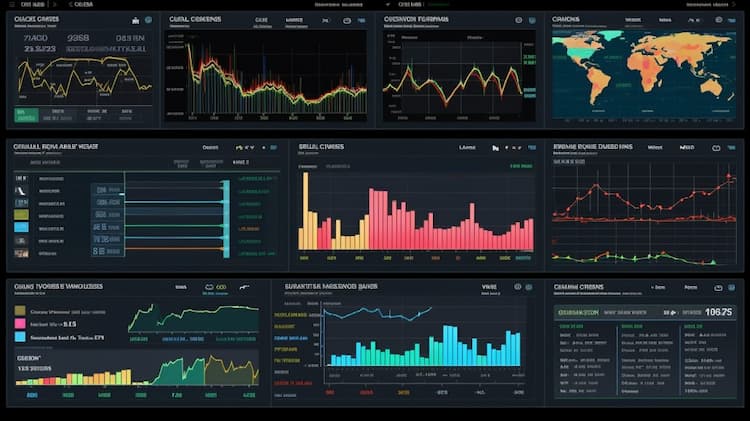
VNQ VS XLRE
Exchange-Traded Funds (ETFs) have become a staple in modern investment portfolios, offering investors exposure to a diverse range of sectors and asset classes. In this article, we will conduct an in-depth comparison between two popular Real Estate ETFs: VNQ (Vanguard Real Estate ETF) and XLRE (Real Estate Select Sector SPDR Fund). We'll explore various aspects of these ETFs, including their tickers, full names, issuers, sectors, top holdings, capitalization, investment strategies, tracking methods, and exposure.
VNQ Vs XLRE: Overview
VNQ and XLRE are both ETFs that provide exposure to the real estate sector, but they differ in terms of their underlying indices and investment objectives. VNQ seeks to track the performance of the MSCI US Investable Market Real Estate 25/50 Index, while XLRE aims to replicate the performance of the Real Estate Select Sector Index. Understanding the subtle differences in their underlying indices is crucial for investors looking to align their investments with specific real estate market segments. test
VNQ Vs XLRE: Sectors and Top Holdings
VNQ encompasses a broader spectrum of real estate investment trusts (REITs), offering exposure to various segments such as residential, commercial, and industrial properties. Its top holdings may include REITs like Prologis, American Tower, and Simon Property Group. On the other hand, XLRE focuses solely on the real estate sector within the S&P 500, which might include companies like American Tower, Simon Property Group, and Equinix. Comparing the sectors and top holdings of these ETFs enables investors to gauge their diversification and potential risk exposure.
 VNQ overlap VNQ VS XLRE
VNQ overlap VNQ VS XLRE
VNQ Vs XLRE: Capitalization and Investment Strategy
The capitalization of VNQ and XLRE can provide insights into their popularity among investors. VNQ boasts a substantial asset under management (AUM), indicating its widespread adoption for real estate exposure. XLRE's investment strategy revolves around tracking the Real Estate Select Sector Index, making it an attractive option for investors who want specific exposure to this sector within the broader market. Evaluating the capitalization and investment strategy helps investors decide which ETF aligns with their financial goals and risk tolerance.
VNQ Vs XLRE: Tracking Methods and Exposure
VNQ and XLRE utilize different methods to track their respective indices. VNQ typically holds a diversified portfolio of real estate securities that closely mirrors the composition of the MSCI US Investable Market Real Estate 25/50 Index. On the other hand, XLRE seeks to replicate the performance of the Real Estate Select Sector Index by investing in real estate companies within the S&P 500. Understanding these tracking methods is crucial for investors who want to ascertain how closely an ETF's performance mirrors the index it tracks.
Conclusion
VNQ and XLRE offer unique opportunities for investors to gain exposure to the real estate sector through ETFs. Both ETFs come with their own set of advantages and considerations, depending on an investor's objectives and risk appetite. For those seeking a comprehensive understanding of the holdings, correlations, overlaps, and other insights within the real estate sector, ETF Insider serves as the ultimate tool. This user-friendly app provides an abundance of information to aid investors in making informed decisions about their investment strategies.
Disclaimer: This article is intended for informational purposes only and does not provide any investment advisory services.
Sources:
Vanguard Real Estate ETF (VNQ) Overview: https://investor.vanguard.com/etf/profile/VNQ
Real Estate Select Sector SPDR Fund (XLRE) Overview: https://www.ssga.com/us/en/individual/etfs/funds/xlre
MSCI US Investable Market Real Estate 25/50 Index: https://www.msci.com/documents/10199/9a725f3d-45b4-4e6e-8a5f-67c81285d06a
Real Estate Select Sector Index Methodology: https://www.spglobal.com/spdji/en/indices/sectors/sp-real-estate-select-sector-index/#overview
VNQ quote and analysis
Discover the top holdings, correlations, and overlaps of ETFs using our visualization tool.
Our app allows you to build and track your portfolio.
To learn more about the VNQ Vanguard Real Estate ETF, access our dedicated page now.
FAQ
Why is VNQ better than XLRE?
VNQ may be considered better than XLRE for some investors due to its specific focus, offering diversification.
Does XLRE beat VNQ?
XLRE's performance relative to VNQ will vary over time, depending on market conditions.
Should I invest in VNQ or XLRE?
The choice between VNQ and XLRE should align with your investment goals, risk tolerance, and desired exposure.
Are VNQ and XLRE good investments?
Both VNQ and XLRE can be suitable investments depending on individual investment strategies, goals, and risk profiles.
What is the correlation between VNQ and XLRE?
The correlation between VNQ and XLRE can vary over time, reflecting differences in performance.




